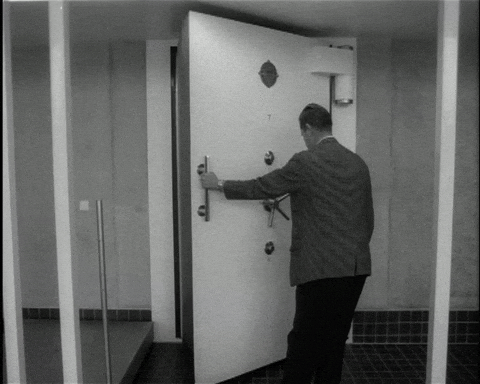Hey guys! What actually happens to your securities if your broker, such as Trade Republic, goes bankrupt?
👉🏻Lasst let's go through it🔎
You still have money in your settlement account while the broker goes bankrupt? That's where the statutory deposit protection comes in Spiel⬇️
🛡️Einlagensicherung🛡️
Did you know that your deposits are protected up to 100,000 euros per customer and bank? This applies to current accounts, savings accounts, call money and fixed-term deposits. Your securities? They are even better geschützt⬇️
💰 Securities💰
Shares, bonds and funds are special assets - this means they always belong to you and not the bank. So in the event of insolvency, you are safe💯
Ok and why?
Thanks to Sondervermögensregelung⬇️
🛡️Sondervermögensregelung🛡️
Don't worry, your securities (shares/ETFs) are safe! Thanks to the special assets regulation, they remain your property and are not part of the insolvency estate. They are kept separately from the broker's assets and can be transferred to another custody account. In the event of insolvency, however, this is exactly where you would have to take action and initiate the securities account transfer💪
Tip: Securities account number and especially the account statements (from time to time) should be saved digitally/separately so that you have corresponding proof of your shares / ETFs in the event of insolvency hastℹ️
Ok, but what about money such as outstanding dividend payments that the broker still owes me? And that brings us to the next topic, namely so-called "outstanding liabilities in the event of insolvency"
💼 Outstanding liabilities in the event of Insolvenz⬇️
Outstanding liabilities from securities transactions are covered up to EUR 20,000 by the Compensation Scheme of German Banks (EdB), whereby 90% of the liabilities are reimbursed👍
Ok, but what exactly are open liabilities or corresponding examples where I am covered with a maximum of € 20,000?
👉🏻Nicht Settled sales of securities: You've sold shares but the money isn't in your account yet? That's exactly what can happen.
👉🏻Dividendenzahlungen: Dividends have been paid out but haven't reached you yet? That counts too!
👉🏻Zinsen from bonds:
Interest that you have earned but has not yet been credited.
👉🏻Verkaufserlöse from derivatives: Options or futures expired and the proceeds aren't there yet? That's part of it too.
👉🏻Rückzahlungen from fund units: Proceeds from fund sales that are not yet in your account.
👉🏻Verrechnete, but not transferred funds:
Money offset by purchases or sales of securities but not yet credited.
👉🏻Erstattungen of costs or fees: Refunds that have not yet been received by you.
👉🏻Nicht executed order bookings: Money reserved for open orders that have not yet been executed.
--- Conclusion ---
Your securities = special assets and cash holdings up to €100k in clearing accounts are protected and remain safe in the event of insolvency🔒
As you can see, you are well protected even in the event of broker insolvency! 💸📈 Only the outstanding liabilities for outstanding transactions of over €20,000 remain an issue🔎
##################
But now the question arises, how secure is a broker like Trade Republic compared to a bank?
🔍Broker vs. bank🔎
What are the differences between Trade Republic and e.g. Deutsche Bank? And above all, WHERE IS MY MONEY SAFE?
(Just an example - no advertising or similar)
🏦Special assets🏦
Trade Republic & Deutsche Bank: Your securities are protected as special assets. This means that they remain your property and are safe in the event of insolvency.
🔒Deposit protection🔒
Trade Republic: Your deposits are protected up to 100,000 euros by the statutory deposit protection scheme. In addition, liabilities from securities transactions are protected up to 20,000 euros.
Deutsche Bank: In addition to the statutory deposit guarantee, there is often extra protection from the Deposit Protection Fund, which can protect higher amounts.
💼Custodian bank💼
Trade Republic: Use HSBC Germany as your external custodian bank. Your securities will remain safe there, even if Trade Republic goes bankrupt.
Deutsche Bank: Hold your securities yourself or via your own structures. The protection mechanisms remain the same.
🛡️Risikomanagement🛡️
Trade Republic: New, specialized broker with less comprehensive infrastructure.
Deutsche Bank: Established, global and systemically relevant bank with extensive resources for risk management and compliance.
📊Regulatory supervision📊
Both: Monitored by BaFin, but Deutsche Bank is subject to stricter requirements as a systemically important bank.
🟰In summary🟰
Your securities are safe with both! Deutsche Bank may offer an additional level of trust, but the legal protection mechanisms are very robust with both providers👍
My personal opinion? For very large assets, a bank such as Deutsche Bank offers a little more security and it makes sense to split your assets between several institutions anyway, keyword diversification➗
Greetings
Stefan
❕Disclaimer ❕⠀
No guarantee for timeliness, appropriateness or accuracy ⠀
- No liability - No investment advice (§ 85 WpHG)
#insolvenz
#traderepublic
#howto














